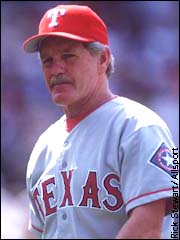 |
|
| | Wednesday, April 19 Texas Rangers | ||||||||||
| By Sean McAdam Special to ESPN.com
Record: 95-67, 8th overall Payroll: $80.8 million, 2nd overall Runs scored: 945, 2nd in AL Runs allowed: 859, 7th in AL What went right? The Rangers offense was mighty -- at least during the regular season. Only the Cleveland Indians scored more runs. The 1-2 bullpen combination of rookie set-up man Jeff Zimmerman and closer John Wetteland was as good as any in either league. The superb seasons enjoyed by Ivan Rodriguez, who won the MVP, and DH-1B Rafael Palmeiro, who nearly did. The leadership displayed by Palmeiro, who showed himself to be more mature and dependable in his second stint in Texas. What went wrong? The team's starting rotation, beyond Aaron Sele, was spotty at best, forcing Texas relievers to throw more innings than any bullpen in the league. The Rangers never did find an effective lefty for the rotation, making the Rangers vulnerable to left-handed-hitting teams like Toronto and New York. The Rangers were quickly bounced from the Division Series, and for the second straight year managed just a single run in three postseason games. In retrospect, the critical decisions were: 1. Signing Jeff Zimmerman out of the Northern League in 1998 and inviting him to spring training. Farm director Reid Nichols deserves the credit for uncovering the rookie reliever. 2. Allowing Rafael Palmeiro to rest his surgically repaired knees at DH. Palmeiro is a Gold Glove-caliber fielder at first, but was better preserved as the DH and delivered his finest offensive season. Lee Stevens, meanwhile, played a more-than-adequate first base in his place and hit .282 with 24 home runs. Looking ahead to 2000 Two key questions 1. Is Ruben Mateo ready to step in and contribute? 2. Was Zimmerman's season a fluke? Can expect to play better Gabe Kapler. Obtained in November's mammoth swap with Detroit, Kapler struggled as a rookie, hitting just .245. With a year of experience under his belt and surrounded by a much better lineup, Kapler should show significant improvement. Can expect to play worse Todd Zeile went into last season with a career .264 batting average. Zeile enjoyed a career year with a .298 average and 98 RBI, but it's unlikely that at 35, that kind of production will continue.
Projected lineup SS Royce Clayton C Pudge Rodriguez LF Rusty Greer 1B Rafael Palmeiro CF Ruben Mateo DH Lee Stevens/Mike Simms RF Gabe Kapler 3B Mike Lamb/Tom Evans 2B Frank Catalanotto/Luis Alicea Rotation/Closer Kenny Rogers Rick Helling Darren Oliver Justin Thompson Estaban Loaiza John Wetteland A closer look The World Series had just been completed when Texas general manager Doug Melvin struck the first blockbuster of the offseason, shipping two-time MVP Juan Gonzalez to Detroit in a mega-deal that brought the Rangers some much-needed pitching and athleticism. Fearing that Gonzalez would price himself out of Texas' reach when he reached free agency after the 2000 season, Melvin decided to move quickly. Resurrecting some talks that had begun during the season, Melvin and Detroit GM Randy Smith quickly put together the swap. Melvin had feared that the Rangers were getting too one-dimensional. True, Gonzalez has averaged 40 homers and 128 RBI over the last five seasons, but what had it gotten the Rangers? Three quick eliminations in the Division Series. In return, Melvin landed Justin Thompson, a left-handed pitcher with a 3.98 career ERA who struggled in 1999 (9-11, 5.11); second-year outfielder Gabe Kapler, who has 30-homer potential; a useful utility player and potential starting second baseman in Frank Catalanatto; and hard-throwing reliever Francisco Cordero. Thompson gives the Rangers a lefty in the rotation, which they've lacked for some time, and which they have sorely needed against the Yankees in the playoffs. Bothered by arm injuries last year, Thompson can be a No. 2 starter if he stays healthy. Kapler gives the club three accomplished defensive outfielders, joining Rusty Greer -- perhaps the finest left fielder in the league -- and center fielder Ruben Mateo, a five-tool star in the making. Cordero may well prove to be the surprise key to the deal. For now, he gives Texas a third power arm for the back end of the bullpen, and in time, could supplant John Wetteland as the closer. The 22-year-old fanned 58 and allowed 35 hits in 52 innings at Double-A. Melvin has a reputation for being an aggressive executive, and this deal is an example of his willingness to take chances. The Rangers had gotten stuck in the first round in three of the last four seasons, and Melvin knew it was time for a change on the field. Sure, Gonzalez' bat will be missed. But the Rangers still have plenty of muscle (Rodriguez, Greer and Palmeiro all topped 100 RBI and Zeile had 98). Meanwhile, the deal improved the Rangers in three areas -- outfield defense, starting rotation and bullpen depth. Melvin also knew that the Rangers couldn't return with the same lineup and sell itself easily to the fans. As it was, the Rangers dropped better than 100,000 in attendance last year despite winning the most games in franchise history. Putting the same team back on the field would have been an invitation for fans to stay away until October. This way, Melvin has given the team a different look in the attempt to get past that first-round playoff hurdle. It's not often you improve your team by trading a two-time MVP, but Melvin appears to have pulled off the trick. Indeed, the Rangers' final trade of the century may prove to be their best. Sean McAdam of the Providence Journal-Bulletin covers the American League for ESPN.com. | ALSO SEE Rangers minor-league report ESPN.com's Hot Stove Heaters  | ||||||||||

